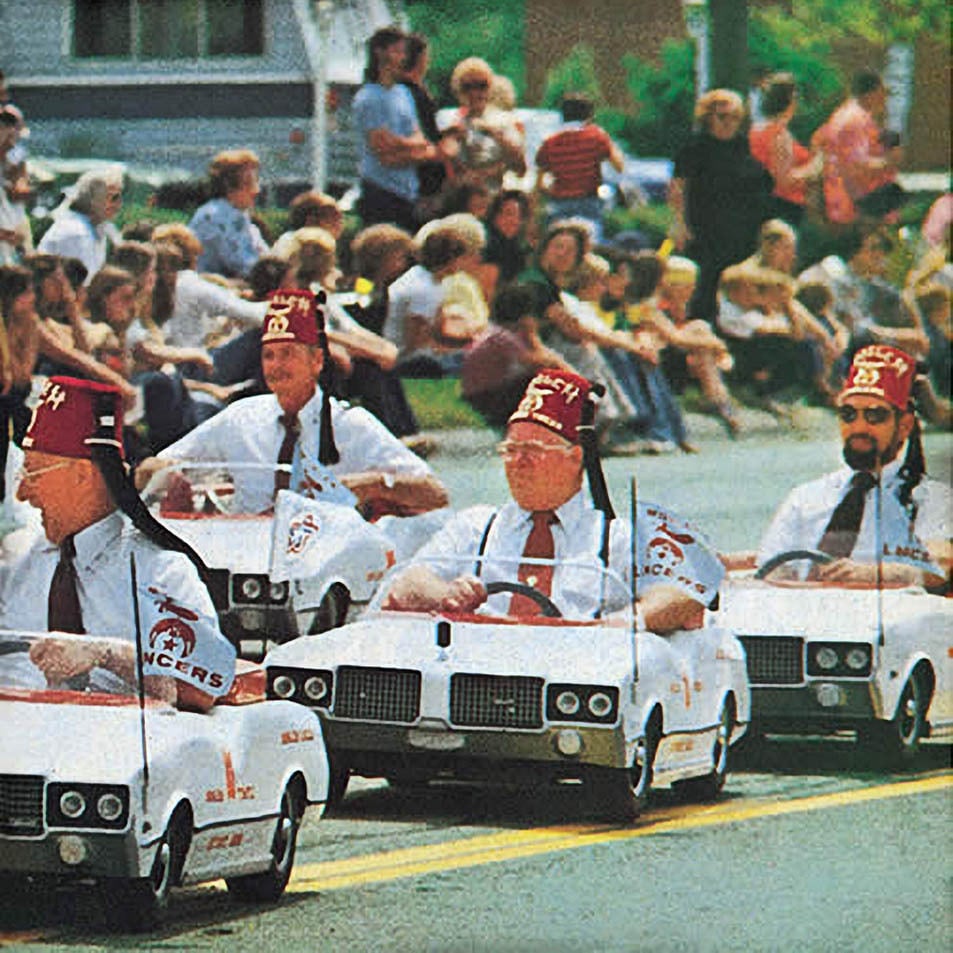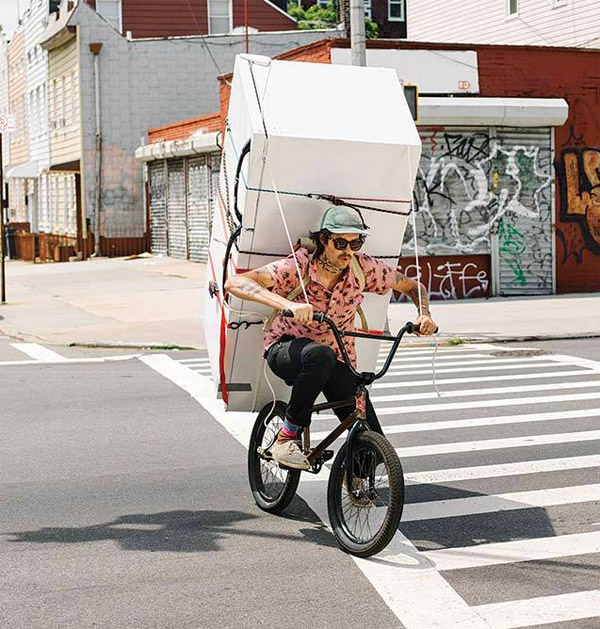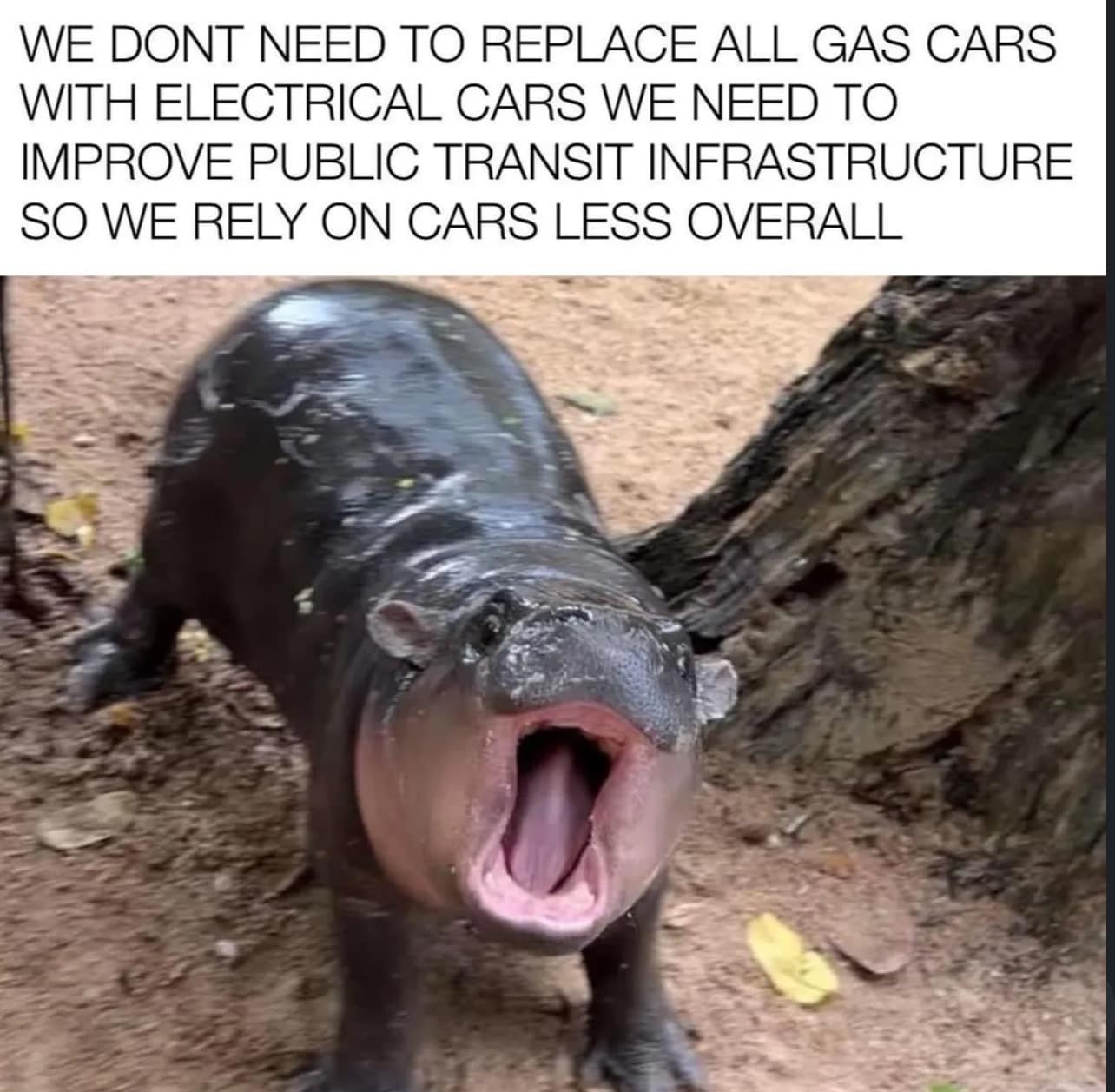Absolutely both are needed. I struggle to understand how people think a rural area with 5 minute drives between homes could be connected to a public transit network that is timely and not astronomically expensive.
Fuck Cars
A place to discuss problems of car centric infrastructure or how it hurts us all. Let's explore the bad world of Cars!
Rules
1. Be Civil
You may not agree on ideas, but please do not be needlessly rude or insulting to other people in this community.
2. No hate speech
Don't discriminate or disparage people on the basis of sex, gender, race, ethnicity, nationality, religion, or sexuality.
3. Don't harass people
Don't follow people you disagree with into multiple threads or into PMs to insult, disparage, or otherwise attack them. And certainly don't doxx any non-public figures.
4. Stay on topic
This community is about cars, their externalities in society, car-dependency, and solutions to these.
5. No reposts
Do not repost content that has already been posted in this community.
Moderator discretion will be used to judge reports with regard to the above rules.
Posting Guidelines
In the absence of a flair system on lemmy yet, let’s try to make it easier to scan through posts by type in here by using tags:
- [meta] for discussions/suggestions about this community itself
- [article] for news articles
- [blog] for any blog-style content
- [video] for video resources
- [academic] for academic studies and sources
- [discussion] for text post questions, rants, and/or discussions
- [meme] for memes
- [image] for any non-meme images
- [misc] for anything that doesn’t fall cleanly into any of the other categories
Recommended communities:
Similarly, I struggle to understand why people think paying for roads to connect houses 5 miles away from each other isn’t astronomically expensive
Not sure who's downvoting you, you're absolutely correct. Infrastructure for rural, and even suburban areas isn't even close to being paid for by the people living there. I thought this was common knowledge. It should be obvious that 5 families living in a single large building require significantly fewer resources than 5 individual homes 5 miles apart.
Rural people, and I get it: I grew up in rural Montana. But America doesn’t run on people like my grandpa driving 6A worth of corn to the grange any more. People like my grandma driving literally 7mi each way to the nearest grocery store isn’t sustain long term
Yeah, I’d love to live in my own mansion on an island and fly my private jet to work. But that’s not realistic if everyone waaaaaaaants to do it
Discussions like this are always a good reminder that area descriptions are different across the world. I live in what is considered a rural area here(in a small terraced house where houses where already there when the Ferrari maps of the Southern Netherlands where drawn in 1780...). Farms everywhere. Behind the terraced housing and small apartments. Still have a population density of 500 people per km². And our public transport is shit outside of the typical congestion hours. Personally I wish they'd both put tram tracks down again with a dedicated track cars can't drive on and improve the cycling paths to be more safe. Guess I'm part of the problem driving an EV, but it gets me to work in 15 minutes. While with public transport it'd 90 minutes if nothing happens when I need to go from one bus to the other. And there simply are no safe cycling paths. (And no showers at work) Shopping I can do by bike or by walking though.
You don't understand how minimal maintenance on roads is less expensive than the equipment and personnel to drive through it on a frequent basis?
That's worrying indictment of the education system.
I'm not sure what your comparing here, but there are constant budget shortfalls for rural paving in my state. It's not cheap. There's also the cost to build the roads (and run electric, phone, internet, etc). There's a reason we needed a bunch of subsidies to add services to rural (and even suburban) places. I think we owe it to everyone in our society to provide basic services, but we don't have to pretend it isn't expensive to do so.
https://www.strongtowns.org/journal/2017/1/9/the-real-reason-your-city-has-no-money
Actually I understand it just fine. My city alone has a $4.4B road maintenance backlog, and it’s not that big of a city
It’s cheap”er” to maintain roads. It is not cheap. Use Google next time
The taxes might be cheaper, but everyone on these cheap roads purchases their own car, their own insurance, wastes their own time in traffic, lives near nothing but a church an hour walk away, etc.
The problem comes when people who insist on living away from civilization demand the perks of civilization by being able to drive to a city and park their cars for free.
This becomes very expensive, and degrades the quality of life of those who live in the City.
Roads in rural new England are most often publicly funded, and are connected into a network of roads and are for transit, so rural roads are in fact a public transit network. I get that you mean trains and buses, though.
Rural roads are just expensive, period. Putting electric cars on them would additionally shorten their lifespan, so I fail to see how either public transit or electric cars are supposed to help. Plus, rural folks are not major emitters, so it doesn't really make much sense to even try to find meaningful emission savings there.
Plus, rural folks are not major emitters, so it doesn’t really make much sense to even try to find meaningful emission savings there.
"On average, cities and large towns produce about four tonnes of CO2 per capita, compared with more than six tonnes elsewhere in the UK"
That is per capita my guy. They emit more per person, but when you've only got 5 families in 10 square miles, getting them to emit less is fuckall in comparison to everyone in a city emitting less.
You eliminate the rural area with 5 minute drives between homes. Japan has a much higher population density more generally, granted, and they do occasionally get older, offset, single homes that are miles from anything else. But they also have extremely rural villages with maybe 2000 people that are still about as rural as you can get and still go in for farming. Many other places (I would say, basically all of them?) do this as well, and not all of them have high population density. I think, almost definitionally, the land use I'm proposing has a higher pop density, but the style of development generally, you'd be hard pressed not to classify it as rural.
The solution here is to orient the land use radially. Also probably to use less land generally, but that's a separate issue. Most land use in america looks like having 20 different farms, that are each like 3 or 4 miles across, sometimes with multiple plots, with each house being positioned as far away from the other houses as possible, usually somewhere along the edge of a plot, and then running roads out to each of them, sometimes dirt roads, sometimes paved, usually some combination of the two for higher use vs lower use vs private.
Instead of that, you do what people have been doing for centuries. You clump the 20 different houses together in one contiguous strip that's placed along some sort of rail line or higher traffic road, and then you disconnect all the plots of land from the particular houses. Ownership doesn't necessarily have to correlate with one plot of land vs another. Then you gain all of the benefits that entails, and if everything is laid out sensibly, then you're only about 3 miles from your specific plot. Utilities become cheaper to maintain, emergencies like fires, medical problems, natural disasters, become much easier to deal with, you can start building some actual infrastructure, like, say, a rail line.
That becomes much easier to justify if you only gotta send that shit to like one concentration of 20 or 30 or houses instead of sending it to those 20 or 30 houses individually, most especially if that line is just passing through before heading somewhere else, which should generally be the case. Maintenance of that rail line also becomes less problematic compared to that of a road if we're considering that this rural area is probably mostly going to be farmland that demands larger industrial equipment shipments, and is going to be shipping back and forth things like grain, bulk goods which would do much better to be shipped by train compared to most other forms of transit. Slap that together with a multi-daily passenger rail line that passes through it as a stop and you're pretty much set.
Very few people ought to be living that way. I think it's fine for those people to use ICE cars. I also don't care very much if the tractors use fossil fuels.
Tiny cars is the only solution

I would unironically drive something like this. I've often wondered if I could make a street legal go cart.
Corporate wants you to find the difference between these pictures

Miles per gallon. Or, in the case of the latter, gallons per mile.
"between 1.5 to 3 gallons per mile", for those wondering
But what if one day five years from now you need to move 20 refrigerators at midnight and all the trains suddenly break down?
/s

Well, I would simply make 20 journeys with my Cybertruck. 10 would be pushing it. The weight of two fridges might snap the chassis.
Yeah, trains.
But then how can we turn trillions of dollars by shackling people to an expensive automobile along with its repairs and insurance costs? How can we further exploit by forcing the use of these vehicles, thus requiring the purchase of their fuels and the use of asphalt companies to pave endless highways and streets? The public yearns to be exploited- no, it needs to be.
I swear this sub is the same thing repeated in different variations over and over
[looks at sub name]
I checked the sub again and it’s only the front page posts I see that aren’t any good, they’re just text post rants like this one, kind of like the Lisa Simpson template, not even a meme
You've just described all of human culture.
pragmatically we should do both. we know no matter how much we scream or wish it that cars are not going to go away but we can expand transit and we should move as many autos and such to electric.
Ah, I see that Moo Deng has infiltrated the fediverse, welcome queen
During WWII they invented the concept of gross domestic product to quantify a country's ability to wage war. The higher the GDP, the bigger the military it could support.
GDP is a measure of how much economic activity there is. If I pay you and then you pay someone else and then that person pays me the same amount we've increased the GDP without actually doing anything. So the US, knowing this was their key performance indicator, set about increasing GDP.
So they make everyone buy a car, then gas, then service, then insurance instead of building rail infrastructure. The same goes for child care: If you make it so both parents have to work and pay someone else to watch their kids that's a much bigger boost to GDP than one or even both parents being able to stay home and raise their kids. Having everyone in a suburb have to buy their own lawnmower and trimmer and grill and stove and washer/dryer and dishwasher also boosts GDP way more than sharing things.
Plus there's the fact that cars require a lot of the same technologies and factories as a lot of war materiel. If we were ever to be in another global conflict we'd need to build all the guns and trucks and uniforms at home, and without a strong car industry we'd have to start a lot of that from scratch.
But we've got the biggest GDP in the world so I guess that's something.
Two things can be true.
We should reduce our dependence on cars. Also, our vehicles should be Electric. Ine dos not preclude the other and so saying we shouldn't do one because of the other is a fallacy.
Hehe cute hippo
Look, I'm not about to take transportation advice from a river mammal that enjoys showering its neighbours with faeces using its helicopter tail.
That being said, he's not wrong.
Yeah, the Public Transit situation in the USA needs a total overhaul; cities are too hostile towards foot and bike traffic. By addressing the capacity needed to transport people to their destinations and altering city planning, cars will become an option instead of a necessity. I’d love for the US to get more into trains like Europe has; that would help bridge the distance for people needing to travel cross country. I’d be able to travel more as a car free person.
